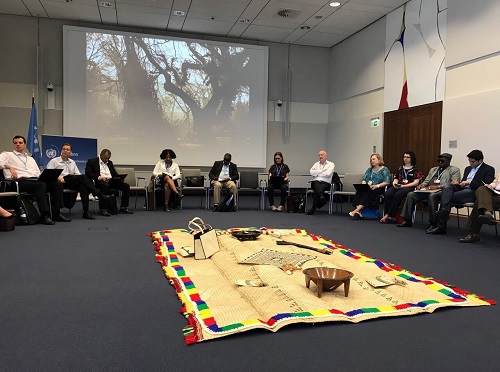
May 08, 2018 Tuesday

May 8, 2018. The spirit of climate justice enshrined in the Paris Climate Change Agreement calls for the international community to urgently pursue the low-carbon development pathway while leaving no one behind.
This was the key message of the Philippines in the Talanoa Dialogue for Climate Ambition[i] Group Discussions organized by the United Nations Framework Convention on Climate Change (UNFCCC) Secretariat last May 6, 2018.
Senator Loren Legarda, Head of the Philippine Delegation to the 48th Session of the Subsidiary Bodies of the UNFCCC convening in Bonn, Germany, stressed the need for big industrialized developed nations to drastically reduce their fossil fuel consumption.
“The most important thing is to institutionalize local climate action or resilience. The way forward is to make sure that the big industrialized developed nations, would actually walk their talk,” Legarda said.
The Senator also renewed the commitment of the Philippines to reduce its greenhouse gas emissions by 70 percent as stated in its Intended Nationally Determined Contributions (INDC).
“We believe that mitigation is a function of adaptation. That is why, even if the Philippines is not a major emitter of GHG, with only 0.3 percent share in global emissions, we vow to remain committed to a conditional 70 percent INDC, which we will translate into our NDC, underpinned by the assurance that support for its materialization is guaranteed under the Paris Agreement,” Legarda explained.
Climate Change Commissioner Rachel Herrera, meanwhile, emphasized the need for industrialized countries to assist developing and vulnerable nations in transitioning to a low-carbon economy and in building community resilience.
“We must be enabled with the capacity, the technology and the means of the implementations to mitigate and to adapt, not because we have a mindset of dependency but because we recognize that doing so cannot be done successfully with using only domestic resources,” Herrera said. "Collective global efforts are very important along with individual country actions and this is the concept of Climate Justice that we have said in Paris. We say “now” and to “leave no one behind,” she added.
Legarda and Herrera alternately represented the Philippines in the Talanoa Dialogue, a year-long facilitative dialogue officially adopted by the Conference of Parties (COP) to take stock of collective efforts in relation to progress towards the long-term global climate goal and to inform the preparation of nationally determined contributions.[ii]
Talanoa is a traditional word used in Fiji and across the Pacific to reflect a process of inclusive, participatory and transparent dialogue. The purpose of Talanoa is to share stories, build empathy and to make wise decisions for the collective good. The process of Talanoa involves the sharing of ideas, skills and experience through storytelling.
Seven Talanoa groups were set up last May 6 as part of the preparatory phase of the Dialogue. The Philippines is under Talanoa Group Lakeba (Lah-kem-bah).
The group discussions will be summarized along with the totality of submissions and inputs received throughout the year. This summary will lead to a Synthesis Report which will inform the political phase of the Talanoa Dialogue which will take place at COP24 in Katowice, Poland in December 2018.
###